Search
Showing 10 of 1954 results for NARSC 2016 conference registration fees student pre advance late July 2016
-
Around the world in five
UK
UUKi launches outward student mobility campaign
Currently just 6.6 percent of UK students are mobile during their studies. As part of a national strategy, Universities UK International (UUKi) is looking to double this figure to 13 percent by 2020.
GLOBAL
New report maps student expectations for language study
A survey of nearly 5,000 current and former language students found very high levels of student satisfaction and expectations – largely well met through language study abroad.
AUSTRALIA
Welfare of international students a top priority
As tertiary educators welcome new students starting this semester, the focus will be on helping them navigate through the challenges of studying in a foreign land. Legal support for tenancy and employment is one focus.
IRELAND
€2.5m centre for US students in Ireland
A €2.5m international residential centre is being developed to house the increasing number of US students opting for study abroad programmes in Ireland. The centre is scheduled for completion in 2019, and will include an education hub, a library, study rooms and video conference facilities.
MALAYSIA
Education policies need to start thinking about robots taking jobs away
With the rapid rise of automation, artificial intelligence and robotics, economists are calling for a greater emphasis on critical thinking in Malaysia’s education policies.
-
Student visa approval rates for 2016 and Rule 18
The student visa approval rates are used to determine what evidence of English language ability an education provider can accept when enrolling a first-time international student. Students from a country with a student visa approval rate of less than 80 per cent have fewer options for evidencing their English language ability.
The 2016 approval rates show that some countries’ rates have shifted. Where a country has changed to above or below 80 per cent, the evidence of English language ability that an education provider can accept will change from 24 February 2017 (one month after the approval rates were published by Immigration New Zealand). Education providers have until this date to adjust their enrolment policies. This requirement is set out in Rule 18 of the New Zealand Qualification Authority’s New Zealand Qualifications Framework Programme Approval and Accreditation Rules.
-
International Student Barometer results
In the 15 April issue of E-News we reported on the results of the International Student Barometer (ISB) survey of international students studying in the English language and PTE sectors.
ENZ commissioned ISB surveys of students at universities and Institutes of Technology and Polytechnics (ITP) to investigate the decision-making, expectations, perceptions and experiences of over 8,000 international students enrolled with these providers.
The surveys feature a global benchmark which indicate how New Zealand compares to other countries offering similar levels of study. Satisfaction can also be compared to previous ISB surveys in 2008, 2009, 2011 and 2013.
The good news is that overall satisfaction in the university and ITP sectors is high.
Eighty-eight percent of ITP students surveyed were satisfied with their experience. This on par with the global benchmark and the 2013 survey. ITP students showing the highest satisfaction level were from South Africa (100 percent), Nepal (98 percent) and Sri Lanka (96 percent).
Satisfaction at universities is also in line with the global benchmark, improving by two percent since 2013, to reach 90 percent. University students who were the most satisfied with their experience included those from Sri Lanka (98 percent), Tonga (96 percent), and England (95 percent).
Across the board, four out of five students would recommend their institution to other students thinking of studying there.
It’s worth noting that overall satisfaction levels vary noticeably by institution and by nationality. Each institution has received their own results to analyse and help inform the development of services and support for their student cohorts. It is important for institutions to be aware of their students’ expectations and needs - in particular, understanding and addressing the needs of the 20 percent of students who would not recommend their institution to others.
Generally speaking, the areas with lowest student satisfaction tend to be around costs, employment/employability and social life; many elements of which are issues for international students globally, not just in New Zealand.
One particular point for New Zealand institutions to keep in mind is the relatively high importance students place on employment/employability factors – both during and after study. Focusing attention on aspects such as work experience and placements, learning that facilitates students’ employability, and careers advice, will help avoid a mismatch between expectations and reality in this area. It will also boost the reputations of both the institution and New Zealand education.
You can read the ISB ITP summary report and sector presentation.
Read the ISB university summary report and sector presentation.
i-Graduate’s New Zealand Director, Kyla Steenhart, presented overall findings from the ISB surveys at the New Zealand International Education Conference 2015 in Hamilton in August. Check out her presentation regarding all four sector surveys here.
-
Kiwis team up at AIEC 2018
Held 9-12 October at the new International Convention Centre in Sydney, the theme for AIEC 2018 was ‘empowering a new generation’ and featured a diverse range of Australian and international speakers. With some 1,600 attendees, it was the largest AIEC to date.
ENZ joined the strong New Zealand contingent there, including 40 representatives from seven New Zealand universities and Ara Institute of Canterbury.
Greg Scott, ENZ’s General Manager, Industry Development said it was a good opportunity to look at international education approaches across the ditch.
“The conference sessions provided valuable insights for participants on approaches from Australia, such as work-integrated learning and employability, internationalisation, transnational education and professional development for international education practitioners.”
Hayley Shields, ENZ’s Director Student Experience, noted that many Australian international education representatives were impressed by New Zealand’s approach to the sector.
“The industry in Australia is taking a keen interest in the New Zealand government’s strategic approach to sustainable growth, and our student-centred approach to experience and development of global citizens.”
As well as presentations from a number of our industry representatives, ENZ provided a New Zealand perspective through a number of sessions:
-
Hayley appeared on a panel discussing innovative models of social inclusion and community engagement, while Ross Crosson, ENZ’s Student Experience Manager, took a deep dive into work led by ENZ’s Student Experience team, which garnered lots of interest and follow-up questions.
-
Anna Dekker, ENZ Scholarships, joined Catherine Stephens (University of Auckland Careers team) and Kate Moore (Academic internship Council) to present how the Prime Minister’s scholarships are an enabler for international internship programmes.
-
ENZ Business Development Managers Richard Kyle and Mary Camp explored the role of SIEBA in the international schools sector and the benefits of a strong and transparent sector/government partnership.
-
Greg Scott joined Rebecca Hall, International Education leader for Austrade, to facilitate a New Zealand-Australia Roundtable meeting with participation from Austrade, Department of Education and Training, International Education Association Australia (IEAA), New Zealand Ministry of Education, NZQA, Immigration NZ, Universities New Zealand and ENZ. They explored the potential for aligning activity in professional development, research and industry practices in areas of mutual advantage. An action plan is being considered to guide initial priorities during the next year.
-
-
Growing offshore interest in NZ through onshore ‘Famils’
‘Famil’, short for ‘Familiarisation’, are visits organised to literally familiarise invited groups of people with a product, or in our case, New Zealand as an international education destination. The intended purpose is that those who attend famils will become valuable advocates for a New Zealand education and therefore drive preference for New Zealand in market.
During Covid-19 these visits were stopped due to border closures. Now that borders have been fully open for some time and our international education sector is recovering, this summer provided the perfect opportunity to show off New Zealand, including our regions and unique culture, and the wide range of educational and experiential offerings to representatives from various international markets.
The summer of showcasing New Zealand started in November with two media famil groups from India and Viet Nam. This was followed by three groups of education agents from Brazil, Germany and South Korea visiting in March and most recently, a famil co-hosted by ENZ and Air NZ bringing Japanese school teachers to regions in the North Island. ENZ subsidises these programmes with other costs covered by participants, regional economic development agencies, and education providers.
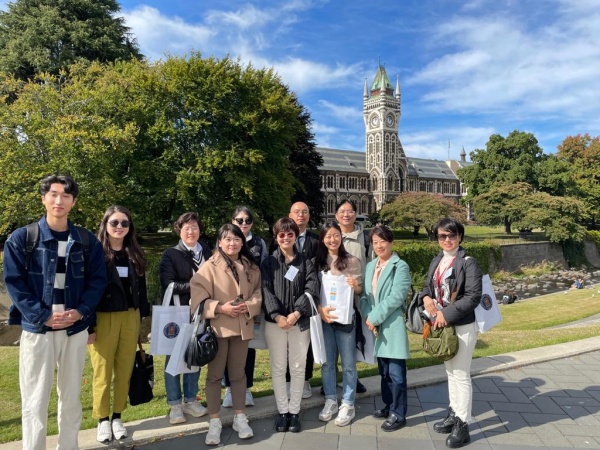
The University of Otago provided a campus tour with a Korean student and didn't miss the opportunity for a classic picture with its famous Clock Tower.
ENZ’s General Manager International, Lisa Futschek said that careful planning goes into facilitating these visits to ensure the famil groups are exposed to a range of subsectors that are relevant to the visiting country while also leveraging the visits to benefit as many providers as possible.
“While we’d love to showcase every New Zealand provider, this is obviously not possible. Much consideration is given to the source market and to the subsectors that we know are popular with that country.
“This ensures we are targeted in our approach and our visitors go back to their countries equipped with the most relevant information that helps build that pipeline of future students," said Lisa.
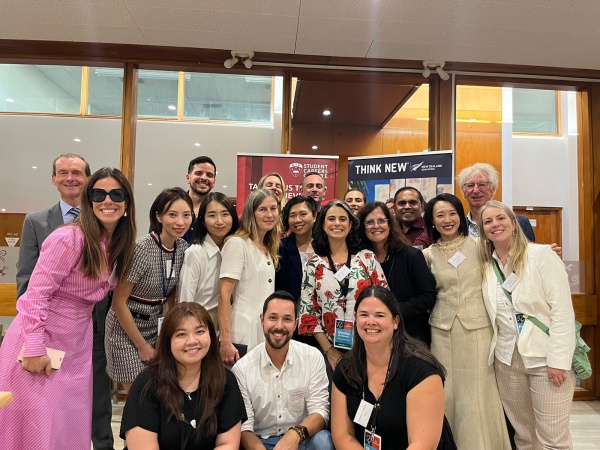
The Brazilian agents attended a networking event hosted by AIS for Auckland-based English Language providers.
“We also look for opportunities in which we can make introductions to several providers in one go. For example, a networking function was held at Auckland Institute of Studies (AIS) with Auckland-based English Language Schools invited to meet the agents from Brazil, cultivating many new connections while strengthening existing ones,” added Lisa.
As well as showcasing the various subsectors, promoting the destination is also hugely important and famil itineraries also include time spent seeing what the regions have to offer international students. This is often organised with the help of the regional economic development agencies.
A perfect example of cross sector collaboration was seen in Ōtautahi Christchurch where Christchurch Educated, an international education organisation based in the region, hosted a networking dinner with the regional economic development agency, ChristchurchNZ. They hosted the Brazilian and German agent famil groups and education providers from various sectors in the Canterbury region.
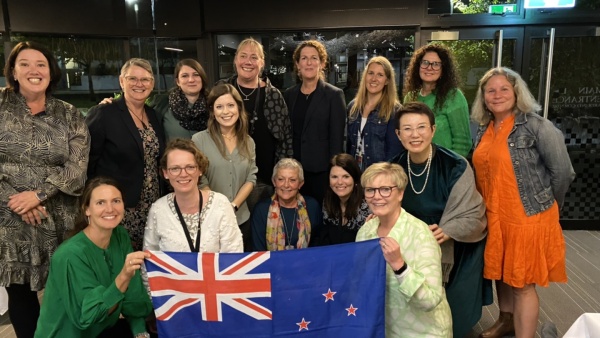
The German agents are pictured here at the Christchurch Educated networking event with a group of Christchurch based education providers (mainly high schools). The event was hosted at Ara’s Visions on campus restaurant with the Brazilian agents in attendance too.
Stefi Porter, International Education Partnership Manager for Christchurch Educated said that bringing everyone together to mutually share the benefits of studying in Ōtautahi Christchurch was a wonderful thing.
“There is certainly strength in numbers and a perfect example of where collaboration between providers and regional economic development agencies can really deliver greater bang.
“Instead of competing against one another, we are sharing resources, time and energy to show the best of our region and the breadth of study options we can offer international students.”
A key outcome of the various famil groups visiting New Zealand is that they become advocates for New Zealand as a place to study, ensuring a steady pipeline of students for years to come. In the post-famil survey, all attendees reported they were either much more likely (87.5%) or somewhat more likely (12.5%) to recommend New Zealand as a place to study for prospective students.
Other positive outcomes, include the positive media articles and social media posts produced by visiting journalists and individuals to their networks in their home countries. This positive coverage not only showcases the quality of New Zealand's education system but also shares the New Zealand education experience with prospective students in their home countries through stories featuring students and alumni.
The India media famil has achieved five in-depth stories to date in Education Times, India's largest newspaper supplement (circulation 500,000). The stories showcase the research prowess at New Zealand universities, including in biotechnology, managing climate change related disruptions, and feature the New Zealand education experiences of a range of students from India.
In Viet Nam 10 articles and four social media posts have been published so far, reaching an audience of 557,000, with more coverage expected in the coming months. Of note is HHT, the top teen magazine in Viet Nam has created a column “letters to New Zealand”, which shares weekly articles about New Zealand written about alumni.
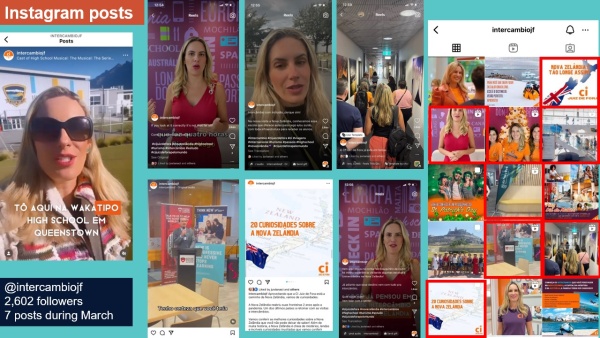
An example of some of the coverage these visits receive. Featured is a compilation of posts that Brazilian agent, Juliana Viana Silveira, owner of CI Intercambio in Juiz de Fora, made on Instagram to her followers during March while in New Zealand. The role of agents in Brazil in international student recruitment is becoming increasingly more important as reported by StudyTravelNetwork here -https://studytravel.network/magazine/news/0/30492
ENZ would like to extend a huge thanks to the education providers and regional representatives for hosting our international visitors and leaving them with a strong sense of New Zealand’s education offerings. The way in which ENZ is able to work collectively with providers and the regional economic development agencies to collaboratively plan the famil is ideal to ensure a good mix of experiences and a balance of activities. This approach helps regions feature strongly in any future famil plans and also helps develop the regional international education ecosystem.
We look forward to hearing about more connections with education representatives at the ICEF ANZA conference in Christchurch.
Check out our image gallery of the famils which shares further details of each of the groups including who attended, where they went and who they met with.
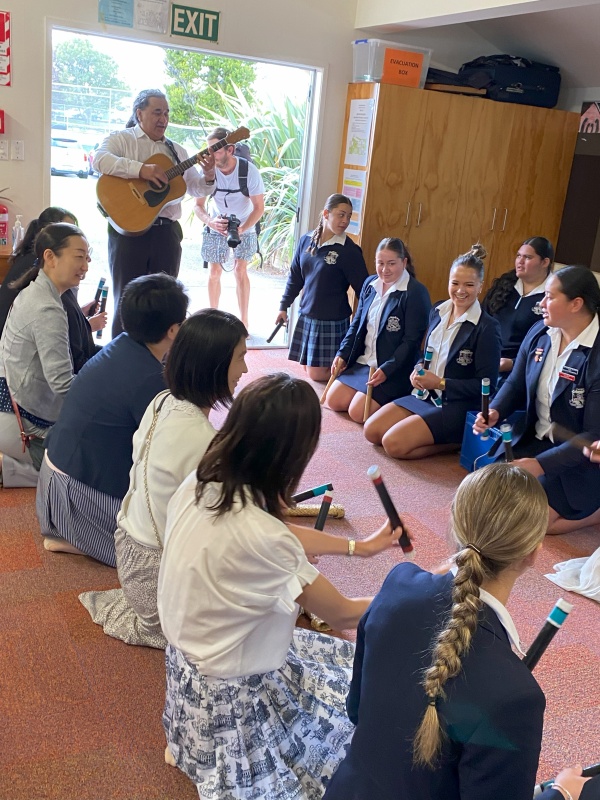
The Japanese All Girls School Teachers participated in a kapa haka class at New Plymouth Girls High School in New Plymouth. Here they are pictured playing the Tītī tōrea Māori Stick game, a traditional New Zealand game which has been played for generations.
-
New code for student care established
You are invited to contribute to the development of guidelines that will accompany the new Code.
Launched by Minister Joyce on 10 March, the new Code better reflects the outcomes expected by students and their families, and the high standards of student support that our industry seeks to maintain.
Find out more about the Code and the new contract disputes resolution scheme on the Ministry of Education’s website here.
As the administrator of the Code, NZQA is inviting our industry to contribute to the development of guidelines to help providers understand, in practical terms, what being a Code signatory involves and offer best-practice examples of pastoral care of international students.
Ensure your voice is heard as NZQA drafts these guidelines. As an industry we want to have a high bar of expected practice when it comes to the pastoral care of students. The guidelines should demonstrate examples of what good practice looks like and what, as an industry, you see as the minimum that should be expected.
The Ministry of Education, along with NZQA and Education New Zealand would like to acknowledge the important contribution many of you made to the development of the new Code by sharing your ideas and suggestions throughout the consultation process. It is through this sort of industry participation and commitment that New Zealand continues to be at the forefront of best practice in international student care.
We encourage you to take part in developing the guidelines.
-
Around the world in five
GLOBAL
New destinations and delivery models will influence student mobility
A new report argues that international student mobility will continue to grow but will see new destinations and delivery models taking over, and partnerships between institutions will be crucial.
US
Declining international enrolment in US higher education in 2017
International enrolment in US higher education declined by nearly 4 percent between 2016 and 2017, with the decline more pronounced at graduate level in both STEM and non-STEM fields.
CHINA
China publishes more science research than the US
China has overtaken the United States in the volume of scientific research it publishes, according to a report from the US National Science Foundation. In 2016, China published 19 percent of the global total of scientific studies.
INDIA
Technical courses revamp focuses on practical learning
To combat rising unemployability and to produce work-ready graduates better suited to industry requirements, curriculum changes are being made in India to engineering and technical courses to make them more practical.
GLOBAL
Mobile graduates launch app for the ‘study abroad generation’
Student reviews of attractions, restaurants, bars and places to visit in countries all around the world have been compiled into an app to help international students navigate their host countries.
-
ENZ updates agents on future plans at ANZA
ANZA is held in New Zealand every three years with this year’s event held at SkyCity Auckland.
Almost 450 participants from 49 countries attended. Agents from China, India, Colombia, Brazil and Viet Nam were most heavily represented. A quarter of agents were taking part in their first ANZA workshop and many had not visited New Zealand before.

ENZ Manager Agents, Dan Smidt speaks at the workshop
“We talked about ENZ’s plans to increasingly engage with quality agents. We want to ensure that quality agents have available to them the most effective tools, resources and training they need to promote New Zealand as a high quality and welcoming international study destination.ENZ Manager Agents, Dan Smidt, said ENZ used the opportunity to give an update on ENZ’s plans for agent engagement.
“We discussed the upcoming re-launch of the Education New Zealand Recognised Agents (ENZRA) programme and the online agent training programme we are creating.
“We also talked about how the new MyStudy platform on the Study in New Zealand website can help agents to advise prospective students on study options in New Zealand.”
ENZ Business Development Manager, Jo Keane, said ENZ staff offered a range of other information, support and advice.
“One of our team ran a seminar on how agents and providers can grow their business profile on Facebook using the collateral and material on ENZ’s current social channels.
“We also ran a seminar focusing on the innovative ways that a number of New Zealand’s regions support agents and grow advocacy through the creation of outstanding student experiences.
Education New Zealand’s plenary presentation in the early evening was particularly well received.
“We talked about our current FutureProof campaign and showed our new FutureProof video, which people loved.
“We also gave an overview of the Student Wellbeing Strategy and the work being done to move from a good-to-great student experience.”
Following the conference, 11 familiarisation tours took place around New Zealand including to Taranaki and Christchurch.
ANZA will next be held in New Zealand in April 2021 at the new Christchurch Convention Centre.
-
International Education Strategy 2022 – 2030
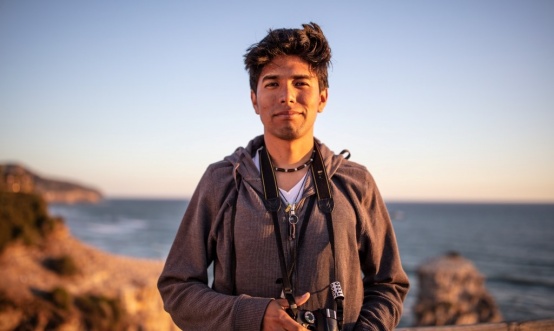
The New Zealand International Education Strategy 2022-2030 was launched on 16 August 2022, during the New Zealand International Education Conference, NZIEC KI TUA.
The strategy seeks to develop a more high-value, resilient and innovative education sector for both international and domestic students.
Its launch followed a period of consultation with the industry, and reflects a refocusing of the previous strategy to take into account the disruption caused by Covid-19 and the steps required to assist the sector to rebuild.
The strategy has three overarching goals:
- Delivering an excellent education and student experience
- Ensuring international education is resilient and sustainable
- Developing global citizens.
Some key aspects of the refreshed strategy include:
- Immigration New Zealand to share up to date information on visa processing times, and on what good applications look like. This is so providers can give more accurate information to students.
- Agencies to monitor the impacts of the Immigration Rebalance policy changes on student visas.
- A monitoring framework to understand the onshore and offshore offerings that will build a high-value and diversified future for international education.
- A commitment from the Ministry of Education to understand what it means to honour Te Tiriti in the provision of international education opportunities for domestic students.
- Clarification that the Government does not expect smaller providers to diversify to the same extent as larger ones, or into areas outside their core purpose.
- Education New Zealand undertaking a stocktake of current international student services and supports to identify any gaps that can be filled.
The full International Education Strategy 2022 - 2030 can be found here.
-
Cities bid international students haere mai
Students from all over the world who are taking the first steps in their New Zealand education journey were extended a warm haere mai in Christchurch and Wellington recently.
A warm Wellington welcome
Around 600 new international students were welcomed to Wellington on Wednesday 16 March at a lively event at Pipitea Marae.
While the weather was cool, the Ngāti Pōneke pōwhiri was warm. The students – some wearing their national dress – were treated to a rousing kapa haka performance followed by a traditional Kiwi barbeque, and were given the chance to capture the moment in a Wellington-themed photo booth and take part in poi lessons.
The Mayor of Wellington, Celia Wade-Brown, welcomed the international students to the creative capital and promoted the opportunities for both study and work in the city.
The arrival of this most recent cohort boosts the international student population in Wellington to more than 5,600, injects an estimated additional $17 million in to the Wellington region’s economy and brings enormous cultural and social benefits to the region’s education institutions and communities.
A colourful Christchurch greeting

Students who have chosen Christchurch as their education destination were embraced in a similar style, at an event hosted by Christchurch Educated on Thursday 7 April.
A pōwhiri at the Te Puna Wānaka marae at Ara Institute of Canterbury set the warm and welcoming scene and was followed up by a greeting from Mayor Lianne Dalziel. During her address, Ms Dalziel acknowledged the important role played by Christchurch’s International Student Ambassadors; and referred to success of the Indian Skills Scholarships.
As in Wellington, the international students had the opportunity to pick up some kapa haka and poi skills.
Canterbury welcomes more than 9,500 international students each year, contributing an estimated $253 million to the regional economy.

